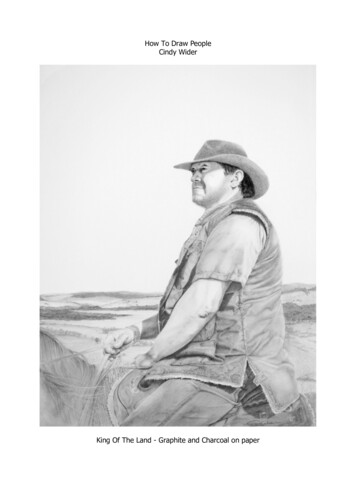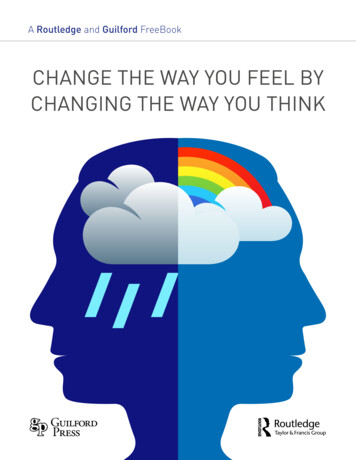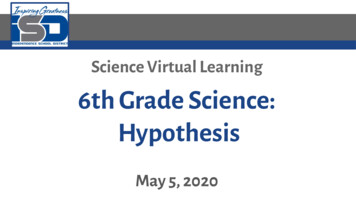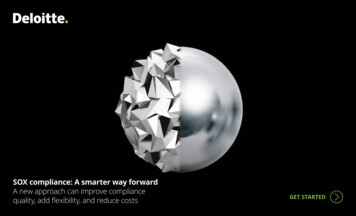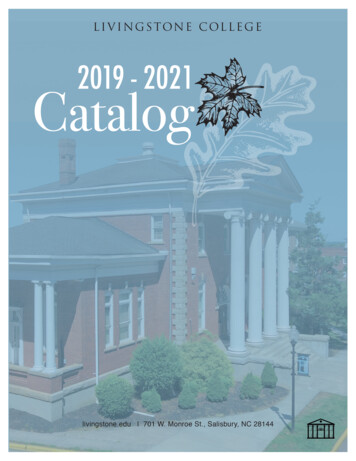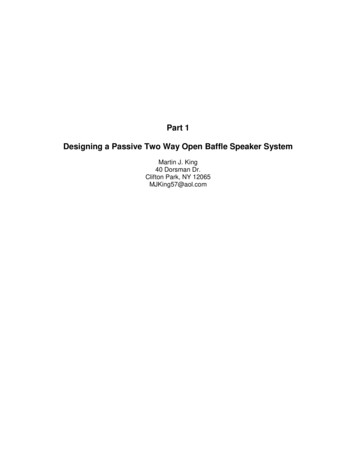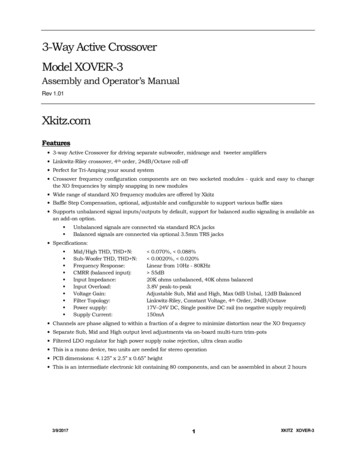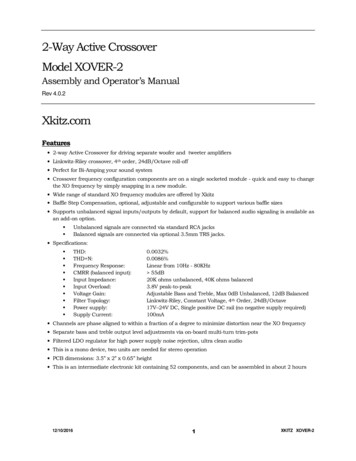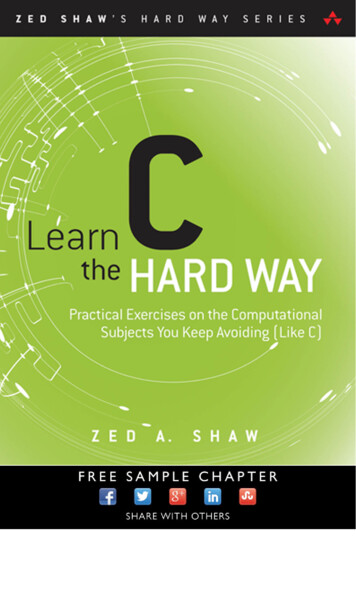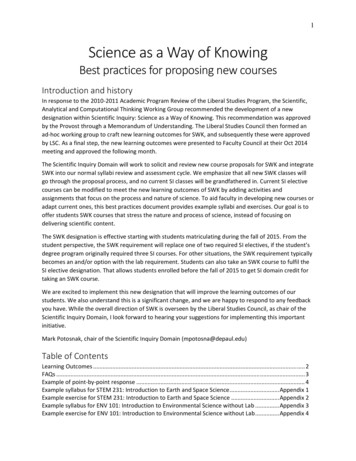
Transcription
1Science as a Way of KnowingBest practices for proposing new coursesIntroduction and historyIn response to the 2010‐2011 Academic Program Review of the Liberal Studies Program, the Scientific,Analytical and Computational Thinking Working Group recommended the development of a newdesignation within Scientific Inquiry: Science as a Way of Knowing. This recommendation was approvedby the Provost through a Memorandum of Understanding. The Liberal Studies Council then formed anad‐hoc working group to craft new learning outcomes for SWK, and subsequently these were approvedby LSC. As a final step, the new learning outcomes were presented to Faculty Council at their Oct 2014meeting and approved the following month.The Scientific Inquiry Domain will work to solicit and review new course proposals for SWK and integrateSWK into our normal syllabi review and assessment cycle. We emphasize that all new SWK classes willgo through the proposal process, and no current SI classes will be grandfathered in. Current SI electivecourses can be modified to meet the new learning outcomes of SWK by adding activities andassignments that focus on the process and nature of science. To aid faculty in developing new courses oradapt current ones, this best practices document provides example syllabi and exercises. Our goal is tooffer students SWK courses that stress the nature and process of science, instead of focusing ondelivering scientific content.The SWK designation is effective starting with students matriculating during the fall of 2015. From thestudent perspective, the SWK requirement will replace one of two required SI electives, if the student’sdegree program originally required three SI courses. For other situations, the SWK requirement typicallybecomes an and/or option with the lab requirement. Students can also take an SWK course to fulfil theSI elective designation. That allows students enrolled before the fall of 2015 to get SI domain credit fortaking an SWK course.We are excited to implement this new designation that will improve the learning outcomes of ourstudents. We also understand this is a significant change, and we are happy to respond to any feedbackyou have. While the overall direction of SWK is overseen by the Liberal Studies Council, as chair of theScientific Inquiry Domain, I look forward to hearing your suggestions for implementing this importantinitiative.Mark Potosnak, chair of the Scientific Inquiry Domain (mpotosna@depaul.edu)Table of ContentsLearning Outcomes . 2FAQs . 3Example of point‐by‐point response . 4Example syllabus for STEM 231: Introduction to Earth and Space Science . Appendix 1Example exercise for STEM 231: Introduction to Earth and Space Science . Appendix 2Example syllabus for ENV 101: Introduction to Environmental Science without Lab . Appendix 3Example exercise for ENV 101: Introduction to Environmental Science without Lab . Appendix 4
2Learning outcomes for “Science as a Way of Knowing (SWK)” coursesIn the context of natural science content:1. Students will understand the scientific worldview. As a result of their learning in thiscourse, students will be able to:a. Identify the types of questions that can and cannot be answered by science, andrecognize the strengths and limitations of science in answering questions about thenatural world.b. Critically evaluate the assumptions that underlie scientific investigations.c. Substantiate the claim that scientific knowledge is durable but can evolve with newevidence and perspectives.2. Students will understand the nature and process of science. As a result of theirlearning in this course, students will be able to:a. Connect evidence to the predictions made by theories and hypotheses, and thenassess the extent to which the presented evidence supports or refutes a scientificclaim.b. Evaluate the role of creativity, curiosity, skepticism, open‐mindedness and diligenceof individuals in scientific discovery and innovation.c. Recognize the uncertainty inherent in the scientific approach and evaluate scientists’efforts to minimize and understand its effect through experimental design, datacollection, data analysis and interpretation.d. Evaluate the role of communication, collaboration, diversity and peer review inpromoting scientific progress and the quality of scientific evidence and ideas, andensuring compliance with ethical standards.e. Determine the extent to which science both influences and is influenced by thesocieties and cultures in which it operates.f. Apply scientific approaches to problem solving and decision‐making in their ownlives, and evaluate how scientific knowledge informs policies, regulations, andpersonal decisions.Note: The Scientific Inquiry Domain Committee will consider proposals grounded in naturalscience content from any instructor.
3FAQS: The New “Science as a Way of Knowing” (SWK) courseWhat is an SWK course, and how does it differ from the standard Scientific Inquiry course? Drawing from the learning outcomes, SWK courses focus on the scientific worldview and thenature and process of science. A typical SI course captures aspects of these points, but manyfocus on scientific content before process. A second change is the emphasis on natural science.While SI classes came from a range of scientific disciplines, SWK classes rely on the perspective ofnatural science to clearly elucidate the process of science.Where did the idea for this come from? Who came up with it? It came out of the extensive science self‐study and response from reviewers in the lastcomprehensive Academic Program Review of the Liberal Studies Program in 2010. Itdemonstrated that students were not learning very basic scientific ideas even though they weretaking lab courses. The notion of making SWKs an SI requirement was taken up and passed by the Liberal StudiesCouncil, a standing committee of Faculty Council, and was part of the Memorandum ofUnderstanding signed by the Provost and reviewed by Faculty Council. A working group of faculty from all colleges produced learning outcomes for SWK classesapproved by the Scientific Inquiry Domain Committee and then passed by the LSC and FC. In short, hundreds of people—and dozens of faculty—from across all colleges and units wereinvolved in the process to create this designation.Will this be a new LSP requirement? How does this change the current Scientific Inquiry (SI) domainrequirements? Yes, this is a new requirement. Beginning in autumn, 2015, SWK courses are required for allincoming first‐year students. Each college and program has slightly different SI requirements. Most outside of the scienceshave three—a Lab, and two Electives. Now, most students will have SI requirements comprisedof: a Lab, an Elective, and an SWK course.How can teachers apply to teach SWK courses? What is the proposal process? An online proposal system is up and running at: e other LSP proposals, a faculty member submits a course proposal online, it gets routed totheir chair and to the LSP, and eventually reaches the Scientific Inquiry Domain for vetting. The LSP can advise and assist at any stage of the process and there will be materials to aidfaculty in writing their proposals. We invite submissions of either existing courses—many SIcourses can become SWK courses––or brand new courses.What information should be included in the course proposal form? In addition to attaching the syllabus and filling out the parts of the online form, please list eachindividual sub‐point from the two SWK learning outcomes and give at least one example of acourse assignment, rubric or other activity that explicitly demonstrates how the course wouldmeet the sub‐point. See an example provided on the following page of this best practicesdocument. Most likely you will need additional space over 4000 characters, so use the option toattach a file.
4Example point‐by‐point response by Margaret Workman, Environmental Science andStudies1. Students will understand the scientific worldview. As a result of their learning in this course,students will:a. Identify the types of questions that can and cannot be answered by science, andrecognize the strengths and limitations of science in answering questions about thenatural world.As a homework assignment, students will read the website “Understanding Science: Science haslimits” and answer questions about the strengths and limitations of science. Students will begiven statements reflecting common misconceptions about science and asked to reflect on thestatements.http://undsci.berkeley.edu/article/0 0 0/whatisscience 12Sample question from assignment: Reflect on the following misconception about science:Science contradicts the existence of God.b. Critically evaluate the assumptions that underlie scientific investigations.As a homework assignment, students will read the website “Understanding Science: BasicAssumptions of Science” and answer questions that highlight how science operates on theassumption that natural causes explain natural phenomena, that evidence from the naturalworld can inform us about those causes, and that these causes are c assumptionsSample question from assignment: Detail the 3 basic assumptions of science discussed in thereading using a ball dropping to the ground as an example.c. Substantiate the claim that scientific knowledge is durable but can evolve with newevidence and perspectives.Students will be given an article to read as homework with questions to be answered. Thearticle is “Continents: Jigsaw Puzzle with No Mechanism.” It describes Alfred Wegener’sdevelopment of the Theory of Continental Drift. The questions will focus on the thought andeffort that went into developing and substantiating ideas that account for the availableevidence at the time; and how these thoughts and ideas change as more evidence becomesavailable. In addition, homework questions will highlight how often much time passes asscientific ideas emerge, develop and are eventually accepted or /jigsaw.pdfSample question from assignment: Discuss how our scientific knowledge of Earth’s landformsand shapes evolved from global catastrophes to the Theory of Continental Drift to our currentunderstanding of Plate Tectonics as new evidence and perspectives became available.
STEM 231Page 1 of 7DePaul UniversitySTEM Studies DepartmentAutumn 2014Course Number:Course Title:Location:Class Times:STEM 231Introduction to Earth and Space ScienceMcGowan South, Room 200Tuesdays and Thursdays, 9:40-11:10 AMSeptember 11-November 18, 2014This course fulfills the Scientific Inquiry Domain Elective requirement of the LiberalStudies Program.Instructor:Prof. Bernhard Beck-WinchatzOffice: 990 W Fullerton Ave, Suite 4400Phone: 773-325-4545Email: bbeckwin@depaul.eduOffice Hours: Tuesdays and Thursdays, 1:00-2:00 PM and byappointmentInstructor bio: Bernhard Beck-Winchatz is an associate professor in the STEM StudiesDepartment. (STEM is an acronym for Science, Technology, Engineering and Math.) Hereceived his Ph.D. in astronomy from the University of Washington in Seattle and hismasters in physics from the Ludwig Maximilian’s University in Munich, Germany. Hejoined DePaul University in 1998 to serve as the associate director of the NASA-fundedDePaul Space Science Center for Education and Outreach where his main job was towork with space scientists, teachers, and museum professionals on NASA-relatededucational projects. In 2002 he also became a member of the DePaul faculty. Hisresearch focuses on both science education and astronomy. He is the author or co-authorof over 50 journal articles. He grew up in a small town near Heidelberg, Germany withnine sisters and three brothers and now lives in Rogers Park with his wife MichaelaWinchatz, who is a faculty member in the College of Communication.Course description: STEM 231 is a science course designed specifically for studentsmajoring in non-science disciplines. Maybe you are wondering why DePaul requires youto take science courses in the first place. Wouldn’t it make more sense to save your timeand energy and focus on courses more directly related to your future career? I think themain reason why it does make sense for all students to study science in college is that welive in a global civilization that profoundly depends on science and technology. Like it ornot, science affects your daily life. There are big questions that have to be addressed bysociety, such as what to do about climate change, and personal questions about your ownlife, such as what to eat in order to stay healthy and what medical treatment to seek whenyou are sick. So a major goal of this course is to learn about the process scientists use toanswer questions and generate new knowledge. How is science as a way of knowing
STEM 231Page 2 of 7different from other ways of knowing the world, for example those used by religiousscholars, historians and artists? How do you distinguish between science and pseudoscience?A second reason why I believe it is important for all students to study science incollege is that knowing how the natural world works can enrich your life and contributeto your understanding of who you are and where you came from. Take a look at thepicture below. It was taken by NASA’s WMAP satellite and shows what the universelooked like shortly after it was born 13.7 billion years ago.Back then the universe was basically nothing but a dense and almost uniform cloud ofhydrogen and helium gas. Not even the basic building blocks of our world, such ascarbon, nitrogen, oxygen, phosphorus and iron existed. But every atom in your body,Earth, the sun and every other object and living being came from the same kind ofmaterial you see in this image. How did we get from this dull cloud of gas to the richnesswe observe around us today? Science provides us with the tools to figure it out.Our basic strategy in this course is to start right here on Earth by asking somefundamental questions about our planet. How do we know its size? How did it form?How is it affected by its celestial neighbors? And then make our way out to the edge ofour universe seen in the picture. On the way we will ask questions about gravity andorbits, light and spectra, the possibility of extraterrestrial life, and the origin and age ofthe universe. At every step of the way we will not only learn scientific facts, but alsoinvestigate the process by which these facts were discovered.What I expect from you: Come prepared to each class. Complete all homework assignments and readings. Contribute to classroom discussions by offering your own insights, questions andperspectives. Complete all in-class assignments. Approach each assignment critically andimaginatively. Ask questions. Constantly evaluate your learning and reflect on what you are learning and what youwould like to learn. Talk to me about this.
STEM 231Page 3 of 7What you can expect from me: I will read your assignments and exams, and provide feedback to help you achieve thelearning outcomes of this course. I will strive to create a classroom environment in which you enjoy learning scienceand feel comfortable participating in discussions. I will respond (almost) immediately to any phone calls, e-mails, or othercommunications that take place outside of the class. I will be respectful of the views students express in class.Learning Outcomes:Science ContentStudents will be able to1. Apply different methods, such as those developed by Eratosthenes and JohannesKepler, to measure basic properties of Earth and other celestial objects.2. Create and use models to predict the positions, motions and appearances of celestialobjects.3. Analyze celestial observations to measure times and positions (celestial navigation).4. Evaluate the relationship between diameter, angular size, parallax and distance todetermine astronomical distances.5. Analyze the light spectrum emitted by stars to determine their basic properties.6. Evaluate the evidence for the scale and expansion of the universe, and generateestimates of the age of the universe from the motions of distant galaxies.Scientific InquiryThis course is a pilot course for the new Science as a Way of Knowing (SWK)designation of the Scientific Inquiry Domain. In addition to the SWK learning outcomeslisted below, students will also be able to achieve the Scientific Inquiry Domain LearningOutcomes listed on the Liberal Studies Program web ies)1. Students will understand the scientific worldview. As a result of their learning in thiscourse, students will be able to:a. Identify the types of questions that can and cannot be answered by science,and recognize the strengths and limitations of science in answering questionsabout the natural world.b. Critically evaluate the assumptions that underlie scientific investigations.c. Substantiate the claim that scientific knowledge is durable but can evolve withnew evidence and perspectives.2. Students will understand the nature and process of science. As a result of theirlearning in this course, students will be able to:a. Connect evidence to the predictions made by theories and hypotheses, andthen assess the extent to which the presented evidence supports or refutes ascientific claim.b. Evaluate the role of creativity, curiosity, skepticism, open-mindedness anddiligence of individuals in scientific discovery and innovation.
STEM 231Page 4 of 7c. Recognize the uncertainty inherent in the scientific approach and evaluatescientists’ efforts to minimize and understand its effect through experimentaldesign, data collection, data analysis and interpretation.d. Evaluate the role of communication, collaboration, diversity and peer reviewin promoting scientific progress and the quality of scientific evidence andideas, and ensuring compliance with ethical standards.e. Determine the extent to which science both influences and is influenced by thesocieties and cultures in which it operates.f. Apply scientific approaches to problem solving and decision-making in theirown lives, and evaluate how scientific knowledge informs policies,regulations, and personal decisions.Writing ExpectationsWriting is integral for communicating ideas and progress in science, mathematics andtechnology. The form of writing in these disciplines is different from most other fieldsand includes, for example, mathematical equations, computer code, figures and graphs,lab reports and journals. Courses in the SI domain must include a writing componentwhere that component takes on the form appropriate for that course (e.g., lab reports,technical reports, etc.)Course Readings: Astronomy Noteshttp://www.astronomynotes.com/ Teach Astronomyhttp://www.teachastronomy.com Understanding Science – How Science Really Workshttp://undsci.berkeley.edu Visionlearning – Your Insight into Sciencehttp://visionlearning.org The Story Behind the Science – Bring Science and Scientists to Lifehttp://www.storybehindthescience.orgCourse Grading:Your overall grade will be based on your performance on the exams, homeworkassignments, and participation. In determining your course grade, each assignment willbe weighted as follows:Midterm exam:Final exam:Homework assignments:Participation:25%35%30%10%
STEM 231Page 5 of 7Final Letter Grades0%-59% F60%-66% D67%-69% D 70%-72% C73%-76% C77%-79% C 80%-82% B83%-86% B87%-89% B 90%-9
Course description: STEM 231 is a science course designed specifically for students majoring in non-science disciplines. Maybe you are wondering why DePaul requires you to take science courses in the first place. Wouldn’t it make more sense to save your time and energy and focus on courses
